
 |
|
|
Click bars for Navigation ---- ---- Published Books by William Hermanns - Click cover image for it's webpage. 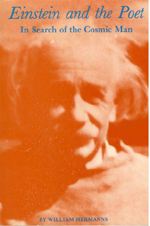 --- 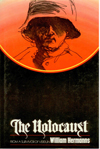 Out of print books available - email us Translate page
---
Like our facebook page WilliamHermanns to get website update notices and some uploaded poetry that talks to your soul. --- Please help support this website. We'll continue to upload more gems from the archives. See Contact Page to communicate with us. To My NeighborSeelentränenNavigationContact / Kontakt |
||||
|
|
Poem of William HermannsP130
Reflections on a Sickbed
In the dining hall there was one special object looking at me from the wall amidst a dozen knights in shining armor, be medaled generals, and bejeweled wives — among them was Marie Antoinette, a relative of the princely clan. It was an ugly face, blood-covered, hanging from a cross. It was brought here, my hostess told me, from Jerusalem by one of her ancestors, a crusader under Frederick Barbarossa. Pointing at the relic, I found myself, spilling out these words: "A god cries for help." I couldn't say more, for I didn't understand why I had said this, and soon left my gracious hostess, perhaps perplexed. The only question that bothered me for awhile was: What had this cross in common with those twenty knights with ironclad breastplates and visors, or the princely array of medals and crosses adorning the breast of her ancestry these last three centuries? In the gardener's cottage of my Aunt Veronica, there also hung a cross, and around it eight soldiers' faces — three were the sons of the gardener's wife fallen in World War I, and five her grandsons adorned with the swastika, three never returned. How often might that old woman look at her cross and cry for help? Was she not here looking at museum pieces? All that I had to give the poor woman was a handshake the same I gave to the princess. Then came a blow, a blow that almost brought my heart to a standstill. Now on a trip through Europe, as a very old man, I'm lying in a hospital in Giessen, undergoing an old man's operation. My heart still beats thousands of times an hour, but would it do so the next hour? Would not there be a limit to the millions and billions of beats which had fed my brain with blood? On the operation table, as I was later told, I almost bled to death. What mysterious force made it cling to beating? The hearts in the portraits in the castle had stopped many a heart before theirs ceased to beat What did the heart mean to me? It beats thousands of times an hour and millions of times a year. I saw man hearts stop but never gave one thought to mine. Is it a mechanism that keeps man alive? Has it a providential function? Why should I care? In the morning I open my eyes, and thoughts direct each minute, sometimes making my heart beat quicker,, sometimes slower. I swam, played tennis, rode through the fields as a youngster. I went to war and survived the Battle of Verdun. Twenty years later was pushed into another war, to fight for human principles. My heart never stopped beating. Sometimes, though, when I saw much suffering, the "why" welled up. Was it carried by the heartbeat into my brain? Had my blood feeling to infuse me with pity? This would mean, in the true sense of the word, I had a heart. But is this true? Don't we say all the time of our fellow man: "He has no heart."? And he may well say this of me, too. On the battlefield of Verdun, we used the bodies of wounded as a shield against the bullets and shells. Their hearts were still beating, so was mine. And how cold this story left me when I walked through a castle gate: Not long before passed through an emperor and empress, soon to be murdered with all their children. Then a young prince, who too had taken rooms in the castle, became a murderer himself: As a German officer in war, he fell in love with the hostess of a chalet in Belgium, challenged her husband to a duel, but pressed into his hand a pistol with a blank bullet. Then through this castle gate walked another empress, whom I happened to know well. She, to save her estates when the Russians occupied her territory, remained in her castle, was taken 'captive and died of grief. And a prince, who walked with me through that very castle gate one day, went insane. Was my heart participating when learning of the fate of those whose faces looked at me from the castle walls? Or was it not rather looking at museum pieces? And the hearts of the sons and grandsons of that gardener woman, for whom she had prayed, had fed their hands with blood and strength to kill. And I had gone for the kill, too, as a volunteer for the Kaiser. In the early month of war in the Argonne, I had a cruel awakening: After seeing hostages shot and children running from burning houses, we were preached to on Sunday: "This is the war for God, Kaiser and Reich." Was it then only by chance that a French peasant woman, whose goat we slaughtered, pressed a picture of St. Francis with his prayer of peace into my hands? Why to me, why not to the others? Among us who feasted at her meager kitchen table was a Catholic theologian who daily said his rosary, until a bullet stopped his heart. Do we not always ask when misfortune befalls us: "Why me?" But seldom do we, if ever, ask of good fortune: "Why me?" One sentence of St. Francis1 prayer in French struck me: "Grant that I may not so much seek to be consoled as to console." I had not much appetite to finish eating that goat of hers. A thought rose from long ago: At ten years I was an orphan and was brought up by an Orthodox Jewish aunt. She sat at my bed, evening after evening before I went to sleep, and said in Hebrew: "God, make me obedient and good so I too can be blessed as Ephraim and Manasseh by Joseph's father Jacob." And also this she taught me: "Never your mouth to speak evil. Let not the left hand know what the right gives. Let not the sun go down over your debt, for you don't know whether he whom you owe has bread in the house for the children. We can pray more away from God than take away from God. No gold is so valuable as the gold of conscience." Was there a mystical connection between the old French peasant woman and my Aunt Veronica? Had I deserved grace in the form of this picture of St. Francis, whose seed was sown ten years previously by my Jewish aunt? Does the spirit not know of r0ligious compartments? But what about my comrades, then, whose mothers prayed day and night that they might come back from the war. bigger than this earthly experience filled with merits or demerits that tells the hearts when to stop? Here I am lying in the hospital in Giessen and I begin to wonder: Certainly I had accumulated some merits. I would hold every morning before the eyes of a German staff sergeant in a hospital in French captivity the photo of his wife and children, since he was stricken with paralysis and slowly wasting away. Or I would run toward a friend hit by a bullet to save him from the hands of French soldiers. But my demerits were not less. For fifty years I resented a close relative for not having saved a sister from the gas chamber when there might still have been time. I loathed the Germans who had put thirty-seven of my family, among them some twelve children, in the gas chamber. And then President Heuss offered me a professorship in the Free University of Berlin; I refused. He then said the remarkable words: "I understand well. I asked Einstein, Martin Buber and Max Brod to return, but one of them said: "How could I accept your invitation, when I do not know if I am put in the position to shake the hand of a murderer of my family.'" How strange is providence. Lying here on a hospital bed, being saved by German hand, I discover, at least for me, a truth: Providence is the inscrutable plan of creation to unfold the spiritual purpose in man. Christ was hung on the cursed tree almost two thousand years ago. I did not live then, but if I had, would I have helped him down? Would I have wet his parched lips? But his cry for help rings still today from the cross, whether it hangs in the castle or in a garden hut. My heart is still beating. I shall leave the hospital in a few days, and I know that I'm not able to give an answer to the why of man's sufferings now after a life of three generations. No one can. But one thing I have learned here in Germany on my hospital bed: How lonely we are, and lonely you have been, you, ray brother in Spirit. Your cry for help is my cry for help. Your heartbeat throbs still in each of our hearts, and this is the only way that I feel that I can help you. and help me: Nailing my demerits onto your cross. Let me then say this: Take all the wrongs I ever did to my fellow man since I could think; the exploitation of others when i loved or when I used my elbows; the ambition that made me minimize others' merits; the bitterness and wrath I felt when I was wronged. And let my love of all whom I have known, the living and the dead, bless them and not return to me void. William Hermanns [P130] Note: P130. Reflections on a Sickbed, Giessen July 14, 1973; Emergency Prostate surgery |
Please support
our sponsors. Click on image to be directed to their website ~~~~~~~~ 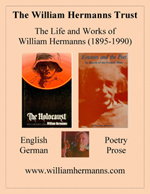 ~~~~~~~~  ~~~~~~~~  ~~~~~~~~ Norton & Holtz Business Solutions  ~~~~~~~~  ~~~~~~~~ 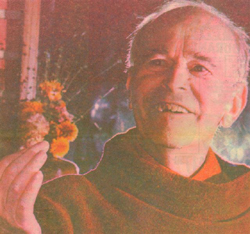 ~~~~~~~~ Published Books below: Click cover image for it's webpage:  Available at Amazon. For Hardbacks Contact us. --- 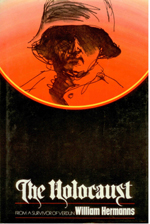 Inquire on out of print books ~~~~~~~~ |
|
|
|
|
|
|
||
|
Prose and Plays |
|
Poetry |
|
Events |
|
Website Info |
Website © Copyright 2011-2022 by Kenneth E. Norton Articles by William Hermanns (c) by William Hermanns Trust |
||||||